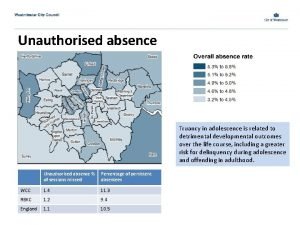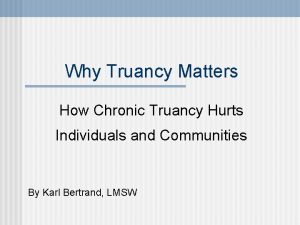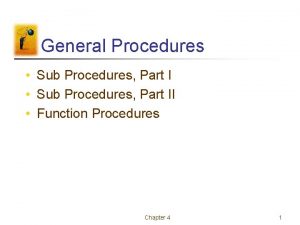Truancy Prevention Measures Procedures 2020 2021 Truancy is















- Slides: 15

Truancy Prevention Measures Procedures 2020 -2021 Truancy is only a symptom of a child in need … identify the cause… • Home • Lack of resources, parenting skills, domestic violence, homelessness etc… • School • Transportation needs, conflict, bullying, learning difficulties, lack of supplies etc… • Personal Life of Child • Medical, mental health, anxiety, death in family, abuse, no uniforms etc… 1

Attendance During COVID • Accurate attendance taking is even more critical during the pandemic. Accuracy will allow ECISD to keep track of students who are falling through the cracks and are no longer attending or engaged. • Teachers must post attendance for students who are participating via In Person, Synchronous Remote and Asynchronous Remote. 2

3

Provide Layers of Documented Interventions • Attendance Clerk = 3 unexcused absences or excessive excused (Contact) • Teacher = 5 unexcused absences or excessive excused (Contact) • Counselor, AP, Principal, Committee = 7 unexcused absences or excessive excused (Truancy Prevention Measures CONTRACT) 4

Excessive Excused • Missing 10% or more of the days offered through each grading cycle Elementary Cycle Elementary 10% Middle School Cycle Middle School 10% High School Cycle High School 10% 8/12/20 to 10/16/20 5 days or more 8/12/20 to 9/18/20 3 days or more 10/19/20 to 12/17/20 9 days or more 9/21/20 to 10/30/20 6 days or more 1/4/21 to 3/19/21 14 days or more 11/2/20 to 12/17/20 9 days or more 3/19/21 to 5/27/21 18 days or more 1/4/21 to 2/19/21 12 days or more 1/4/21 to 2/19/21 4 or more days 2/22/21 to 4/16/21 16 days or more 2/22/21 to 4/16/21 7 or more days 4/19/21 to 5/27/21 18 days or more 4/19/21 to 5/27/21 10 or more days 5

Document Intervention in Eduphoria • Truancy Contact Report= short form to be used for simple phone conversations or interventions • Truancy Prevention Measures CONTRACT – a more lengthy form that should be completed when a counselor, principal, assistant principal or committee meets with the family. This is required by law. The sooner this is completed the better. 6

Document your intervention Step 1: Log into Eduphoria Step 2: Select “Aware” Step 3: Select the “Students” tab on the left Step 4: In the “Search Students” box on the upper left, type in the student’s id # or last name, first name (if the student is not enrolled type in “INCLUDE UNENROLLED” then type in the name or id#) Step 5: Select “Search” or press “enter” on your keyboard Step 6: Select the student when their name populates below Step 7: When the student name populates to right go to “Forms” Step 8: Select “Add Form” Step 9: Select “Truancy” and then select either the Truancy Contact Report which is the simple form used for staff who are doing a short contact or the Truancy Prevention Measures CONTRACT form which is the more lengthy form that should be used when a committee or a principal meets with the parent. After you have selected the form you will use select “Add”. Step 10: The new blank form will populate at the bottom of the student’s forms. Click on “View” for the one you just selected. Complete the form by providing as much info as possible. Make sure to SAVE after completing. 7

Frequently Asked Truancy Prevention Measures CONTRACT Questions • Who can complete a Truancy Prevention Measures CONTRACT? • A Principal, Assistant Principal, Counselor or a committee made up of two or more staff. • Does the parent and student have to be present? • The campus should make several documented attempts to have both the parent and student present. If you cannot get the parent present you may hold the conference via phone with the parent and student. You must indicate on the CONTRACT that the conference was held via phone. You must also let the parent know that you are filling out the CONTRACT and will send them a copy. • How long is the CONTRACT period for? • 45 school days. • What is the purpose of the CONTRACT? • To discover the reasons for the absences and to provide referrals to services to help improve the student’s attendance. • What are some common reasons for attendance problems and what referrals we should we make in the CONTRACT? • Defiant child – Ector County Juvenile Probation Department Suspension/Expulsion Intervention Program 362 -6356 • Lack of parenting skills – Free Parenting Wisely class at COC. Ask parent to call 456 -8569 to schedule class • Transportation Problems – Transportation Department 456 -9869 • No clothing, uniforms or supplies – COC social work services 456 -8569 • Runaway behaviors – Stay Together Program 1 -800 -922 -STAY • Substance abuse issues – SAS Counselor on campus or Counseling Department at 456 -8559 • Child walking off campus – Ask parent to shadow student for 2 days • Questionable excuses from parent – require doctors notes for future absences • Grief or loss issues – campus counselor and/or Rays of Hope 684 -KIDS • No parent involvement – Ask parent to attend the next school based parent involvement activity • Family appears to be homeless – Contact the COC at 456 -8569 • COVID-19 related fears – contact the school nurse or school counselor to discuss fears • What do we do if we cannot get a parent’s participation for the CONTRACT? • If you have made several bonafide attempts to contact the parent and they refuse or you cannot get ahold of the parent, then document your efforts on the Truancy Prevention Measures CONTRACT in the narrative part. The efforts must be more than clerical staff making two calls. It is important to document if the parent refuses. If the parent says “I’m not agreeing to anything” then document this in the narrative. If the parent hangs up on you, document that in the narrative. The court needs to know the parent is refusing to respond. • If the contract expires and the student starts missing again must we do another CONTRACT? • Yes 8

Legal Consequences FAQ • Are the Truancy Laws still in effect during the COVID-19 pandemic? • As of 8/3/2020 the Truancy Laws and the 90% attendance law continue to be in effect per TEA. • When are truancy charges filed? • 10 U/X within a 6 month period as long as there is a current Truancy Prevention Measures CONTRACT in Eduphoria. • Who are the charges filed against? • Parent 1 in i. TCCS. • What are the charges called? • Parent Contributing to Non Attendance is a Class C Misdemeanor and can result in fines and other consequences including orders to attend parenting and other specialized services designed to help the family. • How long does it take to get to court? • Typically 2 weeks after the students 10 th U/X. • What does the court do? • The City of Odessa has a dedicated truancy court. The court handles each case individually. The court has a juvenile case manager who is a former juvenile probation officer who is experienced in working with at risk youth and their families. • Do parents or students go to jail? • Parents can be incarcerated for violating court orders. Students cannot be incarcerated. • Can I find out where a student stands in the truancy process and what happened in court? • Yes, call the COC at 456 -8569. 9

What Works? 1. Parents say they trust teachers the most to talk to them about their child’s attendance. 2. Parents underestimate and do not track the number of times their child misses school. Help them track their child’s absences. 3. Early attendance equals later success. Fact that education was sequential was new information to parents. Talk to parents about specific instruction the student is missing out on. 4. Absences Add Up – 2 absences per month = chronic absences. Parents do not realize this. What Doesn’t Work? 1. The Bad Habits Argument - Early absences equals later ditching. Parents think this message is too negative and say this does not apply to them and so they dismiss the message. 2. The All Absences Are Equal Argument – Parents think this message is unbelievable. They feel some absences are ok. 10

Top 10 Things to Consider When Talking to Parents About Attendance – From the Ad Council 1. Approach the issue of absences out of concern, rather than compliance ✓✓ Make parents feel supported, rather than guilty and in trouble 2. Refer to absences by month, rather than by year. ✓✓ Point out that just “ 2 days missed per month” has consequences, instead of “ 18 days missed per year” 3. Use simple, easy-to-understand language ✓✓ Avoid complicated statistics, hyperboles, or metaphors 4. Be realistic about what you are asking parents to do ✓✓ Avoid implying that parents should send children to school when they’re sick 5. Frame the discussion around “absences” rather than “attendance” ✓✓ Talking about “attendance” validates what parents already believe they do; talking about “absence” focuses their attention on what they’re missing 6. Describe how elementary school builds a foundation for future success ✓✓ Help parents understand that learning is sequential—an absence is a missed opportunity to learn something their child will need in order to understand more difficult material later 7. Give parents specific reasons why absences matter, rather than making vague statements ✓✓ Say things like… “You cannot make up for too many absences with homework or take-home assignments” “Too many absences will allow them to fall behind in reading, writing and math” “Too many absences now can actually make them less likely to graduate high school” 8. Connect parents to the class curriculum to help them understand what their child may be missing ✓✓ Say things like… “We are learning to identify numerators and denominators this week. Please make sure your child does not miss school because his/her understanding of this lesson will make him better prepared for next week’s lesson on adding fractions with common denominators” 9. Encourage parents to do everything they can to ensure their child does not miss school ✓✓ Ask for reasons why the child was out and connect them to appropriate resources (e. g. transportation issues, child care, etc. ) 10. Use text messages to communicate with parents about absences, as one component of ongoing and regular school-to-parent communications. ✓✓ The vast majority of parents said that they trust teachers most when it comes to communicating about absences. Since many parents rely on text messages more than any other form of communication (including phone calls and emails), it can be used to help build trust and regular communication between parents and the school. If you’re considering this approach, take into account these tips for texting parents. 11

Promoting Attendance Through One-on-One Communications Regardless of whether you are conducting a parent teacher conference, paying a home visit or placing a phone call home, you can find ways to use this interaction to help parents understand the importance of attendance and what it means for how they support the school success of their child. Below are some suggestions. Review this list. Use your creativity to come up with other ideas. 1. Prior to meeting with or talking to the parent, take a look at this student’s attendance record. Calculate the percent of days missed in school through the grading period. Note whether the student has • Satisfactory attendance (misses 5% or less of class) • Chronic absence (misses 10% or more of class) • Severe chronic absence (missing 20% or more of class) 2. Offer positive reinforcement to those students and families with satisfactory or better attendance. 3. For those who are chronically absent, plan to discuss the importance of attendance and find out parents’ perspectives what is contributing to the excessive absences. Ask parents both about what makes it difficult to get to school. Find out if they can think of any positive examples of activities or supports that made it easier to get their child to school (whether that is, for example, an engaging classroom activity or when family members or friends are available to help drive or walk their child to school. ) Discuss what would help to reduce the level of absences. Help them understand absences – even if excused – can harm their child’s ability to learn and succeed in school. 4. If appropriate, consider referring the family to 2 -1 -1 to help the family obtain extra social and economic supports. 2 -1 -1 is an information and referral line supported by local United Ways in many communities across the United States. If you are on the phone, consider scheduling an in-person meeting or home visit during which you could have this discussion. 5. Share handout offering research on the importance of attendance and tips for how parents can ensure students attend school every day. If this is a phone call, consider mailing the handout to the parent as part of a follow-up communications. 12

WHAT TO SAY TO PARENTS OF YOUNGER CHILDREN (ELEMENTARY SCHOOL) • Families can make a difference. From a child’s first day of formal schooling, the family can set the expectation that school attendance matters to you and that you won’t allow an absence unless someone is truly sick. • We understand that children will get sick and need to stay home occasionally. The important thing is to get your children to school as much as possible. • People tend to grow concerned only about students who miss consecutive days of school, but occasional absences can be just as disruptive as they can add up before you know it – just two to three days a month can add up to nearly 10 percent of the school year. • Attendance matters as early as kindergarten. Studies show many children who miss too many days in kindergarten and first grade can struggle academically in later years. They often have trouble mastering reading by the end of third grade. • Preschool is a great time to start building a habit of good attendance. Studies show that poor attendance in preschool can predict absenteeism in later grades. • For younger children, parents can set a regular bed time and morning routine. Make sure they get 9 to 11 hours of sleep. You can lay out clothes and pack backpacks the night before. • Get to know your children’s teachers and administrators. With younger children, make sure you introduce your child to teachers before school starts and keep in touch with the teachers. • Remember you can turn to the school for help. Many schools offer services for the whole family to help, for example, with issues concerning access to health care and reliable transportation. 13

WHAT TO SAY TO STUDENTS (Secondary) • School is your first and most important job. You’re learning about more than math and reading. You’re learning how show up for school on time every day, so that when you graduate and get a job, you’ll know how to show up for work on time every day. • When you’re not here, we notice because we care and we want you to be successful. Students who attend school regularly are more likely to graduate and find good jobs. In fact, a high school graduate makes, on average, $1 million more than a dropout over a lifetime. • A student who misses 10 days or more during a school year is 20 percent less likely to graduate from high school and 25 percent less likely to ever enroll in college. • If you think missing a day here or there won’t matter, think again. By missing just one day every two weeks, you would be on track to miss 10 percent of the school year – and that can happen before you know it. • School only gets harder when you stay home too much. Sometimes it’s tempting to stay home because you’ve got too much work or you don’t understand what’s going on in class. But missing a day only makes that worse. • We understand that you will get sick sometimes and need to stay home. The important thing is to get to school as often as possible to help stay on track with assignments. • Chronic absence can affect your ability to earn a living. Dropouts are less likely to succeed in a career. And even those who do graduate won’t do well at work without good attendance habits. Nearly 80 percent of people in prison lack a high school diploma. • Skipping school may sound fun, but it can have serious consequences, including jail time, fines, or even the loss of your driver’s license. • If you’re having trouble getting to school – issues with transportation, bullies, etc. – tell someone, such as a guidance counselor or your parents. Many schools offer services for the whole family to help, for example, with issues concerning access to health care and reliable transportation. 14

456 -8569 Resources and Handouts: Handouts and Posters 15
 Primary prevention secondary prevention tertiary prevention
Primary prevention secondary prevention tertiary prevention Anova repeated measures
Anova repeated measures Truancy tracker
Truancy tracker Truancy consequences
Truancy consequences Truancy vs absence
Truancy vs absence Truancy officer michigan
Truancy officer michigan Truancy 1298
Truancy 1298 School refusal
School refusal Truancy elimination plan
Truancy elimination plan Kshousingcorp/eviction-prevention-program
Kshousingcorp/eviction-prevention-program Teacher goals for 2020-2021
Teacher goals for 2020-2021 Nfhs volleyball uniform rules 2020-2021
Nfhs volleyball uniform rules 2020-2021 Elearning utmspace
Elearning utmspace Ramiro de maeztu bachillerato
Ramiro de maeztu bachillerato Edu.ro programe scolare 2020-2021
Edu.ro programe scolare 2020-2021 Clements high school course selection
Clements high school course selection





























